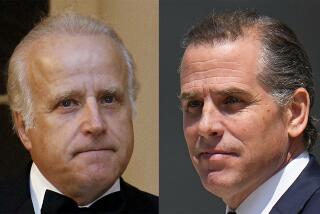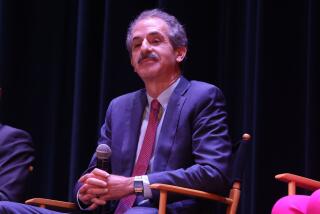Congressmen intercede for 2 reporters
- Share via
The new chairman of the House Judiciary Committee and an influential Republican congressman asked Atty. Gen. Alberto R. Gonzales on Thursday to withdraw grand jury subpoenas to two San Francisco Chronicle reporters facing 18 months in federal prison for refusing to disclose their confidential sources of information about steroid use in professional sports.
In 2004, Mark Fainaru-Wada and Lance Williams wrote articles quoting closed-door testimony of Barry Bonds of the San Francisco Giants, Jason Giambi of the New York Yankees, and sprinter Tim Montgomery about the use of drugs supplied by the Bay Area Laboratory Cooperative, known as BALCO.
So far, five defendants, including Victor Conte, BALCO’s founder, have pleaded guilty to illegal drug distribution. Another grand jury is investigating whether Bonds committed perjury by denying that he knowingly used steroids.
“There can be no doubt” that the work of Fainaru-Wada and Williams “has been significant,” Rep. John Conyers Jr. (D-Mich.) and Rep. Thomas M. Davis III (R-Va.), ranking minority member on the House Committee on Oversight and Government Reform, wrote to Gonzales.
“This coverage spurred Congress to action ... and forced Major League Baseball, among others, to announce an historic change in their steroid rules and policies,” the congressmen added.
“The subpoenas issued to those reporters and their newspaper seeking confidential source information are troubling both on the specific facts of their case and because of the great damage they could cause to our nation’s press and the First Amendment,” the letter states.
Although a protective order is “an important interest,” they said, “this case is significantly different from others involving a breach of national security, terrorism of serious criminal conduct.”
In September, U.S. District Judge Jeffrey S. White in San Francisco sentenced the two reporters to up to 18 months in prison for contempt, and imposed a $1,000-a-day fine on the Chronicle. But he suspended those penalties until the U.S. 9th Circuit Court of Appeals, which is set to hear the matter in early March, rules on the case.
In addition to the letter, Conyers made a speech on the issue at the National Press Club in Washington on Thursday, where he called for a federal law that would shield reporters from facing jail time for refusing to divulge the names of confidential sources. A bill on this issue died in the Senate last year. Lucy Dalglish, executive director of the Reporters Committee for Freedom of the Press, said she expected a new bill on the issue to be introduced this year.
Tasia Scolinos, a Justice Department spokeswoman, said the department is reviewing the letter. “As a matter of policy,” she said, “the Justice Department issues subpoenas to members of the media only when absolutely necessary.”
*
More to Read
Get the L.A. Times Politics newsletter
Deeply reported insights into legislation, politics and policy from Sacramento, Washington and beyond. In your inbox three times per week.
You may occasionally receive promotional content from the Los Angeles Times.










